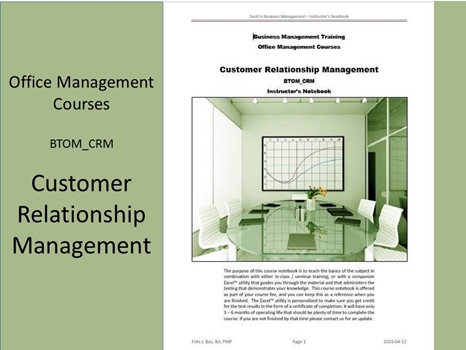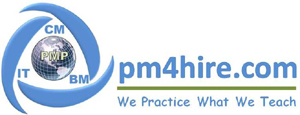
Customer Relationship Management BTOM_CRM
Another key career opportunity for people interested in administrative support is the CRM role of Customer Service Representative (CSR) that can cover a wide range of responsibilities based on the nature of CRM operations. With increased dependency on distance service providing we see a growing role of CRM in business operations today. To be effective you don’t just depend on any warm body somewhere in the world to placate customers – you ensure that you have a well-trained CSR team that works with CRM systems to deliver the right customer experience. It is important to understand the potential complexity of this role, and why in many organizations a CSR has a growing level of responsibility to work with customers to keep them happy when most customers no longer pay a visit to the office to talk out difficulties. The relative isolation from the customers can be a blessing for some CSRs, while it is a disadvantage to others that relish the face-to-face contact. This will be further explored in another career focus on selling.
Modern CSRs are motivated by what they can offer clients and how they can be the voice of the organization they work for. In many cases they have to develop a good grasp of what business the company conducts and how the customer interacts with the company, in order to help them resolve service issues. They need to be well educated, creative thinkers and problem solvers to grasp what bee is up a customer’s bonnet in order to defuse the situation and guide a customer through a problem resolution process. They need superb communications skills and Emotional Intelligence to understand how the customer perceives the situation, even if that is wrong. They need a desire to work with the customer to turn negatives into positives and to find ways so that the customer is pleased with the outcome while operating within the company guidelines.
Obviously, this is not an easy task at times: people with the right experience and a knack for that customer management effort can do very well in this role. A Customer Relations Management (CRM) system will typically evolve as a heuristic engine that learns from life experience as issues are recorded, and that can catalog potential solutions as management analyzes the challenges faced by the CSRs. Mastering the use of CRM tools is also a powerful skill that CSRs must build. It is important to keep in mind that it is much cheaper to keep a customer through good service than to develop new customers to replace those that walked. We have come a long way since CSRs focused on collections (they still do) and excuses without much power to resolve issues.
As products and/or services become more complex there is a greater need for assistance with customer issues to find acceptable solutions. It can be a source of stress for CSRs whose hands are tied with respect to what solutions they can consider, but also a powerful feeling of finding a mutually acceptable solution for the customer and the company. The training for how to handle these situations is not trivial – inevitably you make mistakes that are shared for everyone to learn from, and it takes time to develop the right confidence to see problems as opportunities. Training is a challenge, because customers and supervisors may not see eye-to-eye with respect to who is a good performer in this regard. It is difficult to overcome conflict and turn this into a positive effort to find a solution (even if you have to agree to disagree). You cannot always get the customer what they want, and they do not always want to listen to the reasons why. In this session we will explore the process for solving problems, as well as for strategies to use “off line” to have the team go over issues that were monitored to see what they can come up with.
In order to give CSRs a fighting chance to help retain customers there is a growing tendency for empowerment – a certain amount of freedom to allow the CSR to offer solutions and trade-offs to keep customers and to offer assistance that benefits customers. It is not always practical to escalate decisions while keeping a customer on hold – it will not make them happier – so at times making an offer and keeping that customer can be an acceptable trade-off. If that decision was wrong then it is to be discussed for future situations of a similar nature rather than held as a black mark on the CSR who had to find a solution on the spot. This is an opportunity to use the CRM to keep track of issues and solutions the company prefers, and it lowers the dependency on supervisors to deal with issues that can be handled more effectively by empowered CSRs.
In many cases we think of difficult customers as the reason why CSRs must have superb people skills. There are customers who will try each time to get more for less, but if trends develop you can flag customers in a CRM and put boundaries around how much give and take might be appropriate. CSRs can be subject to unpleasant dialog at times, and it is important to explore what makes customers act that way (and we must make sure we do not contribute to the problem). There are ways to put you mentally at some distance and not take things personal, and learn ways to defuse difficult customers or people who are easily offended due to cultural or language barriers. Older customers can present a challenge in that they may not understand the technology and create “defects” and/or find it difficult to relate to the CSR. Learning to deal with impatient or angry customers is not easy, nor is a customer who is analytical and demands a great deal of knowledge a CSR may not have.
An ability to influence others is paramount. Imposing constraints is not the answer to problem solving, but to consistency. To solve problems a leader must coach the staff to use independent judgment and the CRM resources to negotiate a satisfactory resolution. Leadership means that you share a vision of how you want a business to operate and succeed, and you empower CSRs to help you accomplish that vision. Mistakes are opportunities for learning and improvement: if you cannot handle a mistake you establish a revolving door operation – it is the overall skill of assisting customers that you want to evaluate.
The change in CRM technology has been significant, but so has the use of support equipment and services offered through the internet. That means CSRs have to be more tech-savvy than ever before, with a good grasp of how all these transaction input points are blended into overall delivery of customer service. With routine transactions increasingly of a self-serve variety the average transaction handled by CSRs tends to be more complex than in the past. Change in technology is happening so quickly that it can be a challenge for CSRs to keep up with how to use all that new functionality, so it is important to have change management in place to constantly help in upgrading their skills with inbound service and outbound marketing calling concentrated in larger call centers.
Learning Formats BTOM_CRM
This course will be available in a classroom setting (public or company private) with approximately 30 contact hours.
PDF – Certificate Of Completion
This course offers a certificate of completion that identifies the course, the student, and a brief description of the course. To receive a certificate the student must have attended at least 80% of the course sessions. This personalized certificate is forwarded to the student by Email.
PDF – Course Notebook
This course includes a notebook in PDF format that provides the minimum knowledge the student must master in order to obtain the certificate. In the notebook you will find references to other study materials. Students receive the notebook by Email when their registration is confirmed.
PDF – Program Overview
An overview of this study program can be downloaded from the website by right-clicking on the program link on the enquiry page.
PDF – Current Training Schedule
A list of upcoming training sessions can be downloaded from the website by right-clicking on the schedule link on the enquiry page.
Registration – Service Providers
To register for any training course please look on the enquiry link page of your service provider (from where you accessed this website). On the page you will find a registration request form where you can order the course that you are interested in. The availability dates will be provided to you, along with payment instructions if you decide to go ahead.

 |
|